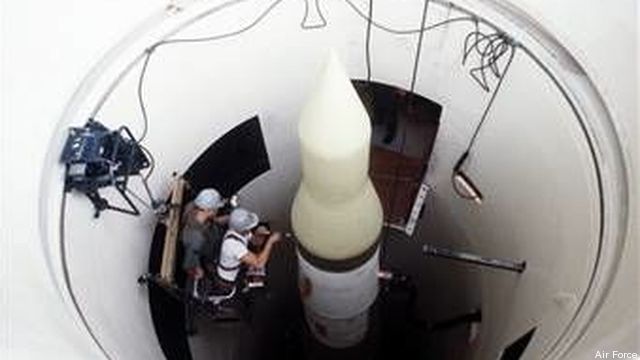The Triad Is Not The Trinity: A Response To Gen. Chambers
Posted on
 The recent commentary by Maj. Gen. William Chambers touting the war-prevention benefits of nuclear weapons in this publication is unconvincing.
The recent commentary by Maj. Gen. William Chambers touting the war-prevention benefits of nuclear weapons in this publication is unconvincing.
Gen. Chambers, the Air Force’s assistant chief of staff for strategic deterrence and nuclear integration, overstates the peace-promoting virtues of nuclear weapons. In addition, he exaggerates the benefits of the nuclear triad and downplays the significant financial resources that will be required to sustain it.
Gen. Chambers argues that the United States should continue to maintain a triad of nuclear-armed intercontinental ballistic missiles (ICBMs), submarine-launched ballistic missiles (SLBMs), and long-range bombers for the foreseeable future.
In particular, he leaps to the defense of the land-based missiles and the bombers, the two legs of the triad provided by the Air Force which of course is Gen. Chambers’ service.
The general opens his essay by marking the 50th anniversary of the Cuban Missile Crisis, which occurred in October 1962, and is the closet the world has ever come to destroying itself. According to Gen. Chambers, “our nuclear forces played a central role in winning the peace.”
This is a bad misreading of history. While President John F. Kennedy and Soviet leader Nikita Khrushchev exhibited restraint because they feared the consequences of a nuclear war, it was in fact nuclear weapons that made the crisis so perilous. As author Michael Dobbs has written, “As the two superpowers geared up for a nuclear war, the chances of something going terribly wrong increased exponentially.”
Based in part on his understanding of the Cuban Missile Crisis, Gen. Chambers contends that the stability engendered by nuclear weapons has “prevented the deaths of tens of millions of civilians in wars between great powers that did not occur.” Yet while it is true that the great powers have avoided major wars and that nuclear weapons may be one of the causes, it is not at all clear that the bomb has been the decisive factor. It is also worth noting that nuclear weapons have not prevented all types of war.
Moreover, the Cuban Missile Crisis, and other brushes with disaster during and since the Cold War, demonstrates that nuclear deterrence is not foolproof. It is susceptible to misperception, miscalculation, technical failure, and/or accident. The threat of nuclear terrorism poses an additional harrowing danger.
Gen. Chambers’ case for the triad is equally flawed. He writes that the triad remains vital because “the number of nuclear armed states is increasing” and “complex regional crises” could “approach the nuclear threshold in the near future.” However, only North Korea has joined the
nuclear club since 1998 and it is believed to possess fewer than 10 nuclear weapons. Gen. Chambers does not explain why the triad is necessary to deter North Korea or prevent a regional conflict between smaller nuclear powers such as India and Pakistan from escalating to the nuclear level.
Gen. Chambers defends the ICBM leg of the triad on the grounds that it ensures “no future enemy would consider nuclear use or coercion.” But what of the ability of nuclear warheads on a dyad of submarines and bombers to perform this deterrence function? Gen. Chambers is silent on the matter.
Given the survivability and promptness of the submarine leg and the fact that ICBMs are unlikely to be used in a nuclear conflict with most of the countries we might attack with nuclear weapons (because the missiles would have to fly over Russia to reach their targets), ICBMs are really only useful for fighting a major nuclear war with Russia – a threat which has long since disappeared.
Gen. Chambers claims that the cost to maintain the triad indefinitely is manageable. But our budget pressures are real and likely to get worse, which is why high-level Pentagon officials without a bureaucratic interest in the survival of the triad have been raising questions about its
affordability.
As former Vice Chairman of the Joint Chiefs Gen. James Cartwright put it: “The challenge here is that we have to recapitalize all three legs [of the nuclear triad], and we don’t have the money to do it.”
Every dollar spent to modernize and replace aging nuclear weapons systems is a dollar that cannot be spent on defense priorities that are far more relevant to the 21st century security environment, such as upgrading conventional air and naval power projection capabilities.
The assumptions that undergird the current U.S. arsenal of approximately 5,000 nuclear warheads were devised for a confrontation with the Soviet Union that no longer exists. As the Obama administration contemplates its second term defense priorities in a time of budget austerity, it should not let outdated Cold War constructs such as the triad stand in the way of reshaping U.S. nuclear policy.
Kingston Reif is director of nuclear non-proliferation at the Center for Arms Control and Non-Proliferation.
Subscribe to our newsletter
Promotions, new products and sales. Directly to your inbox.
